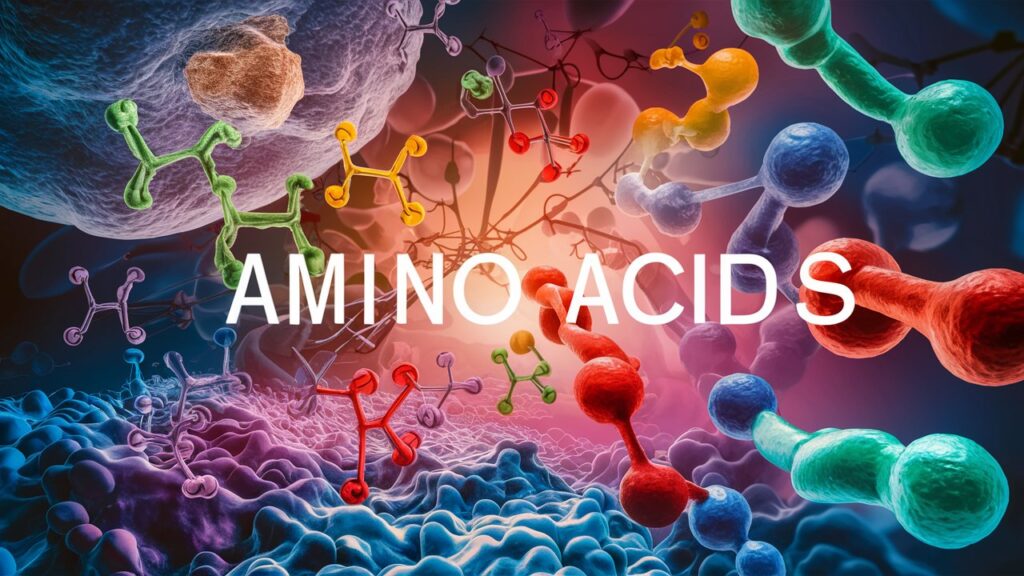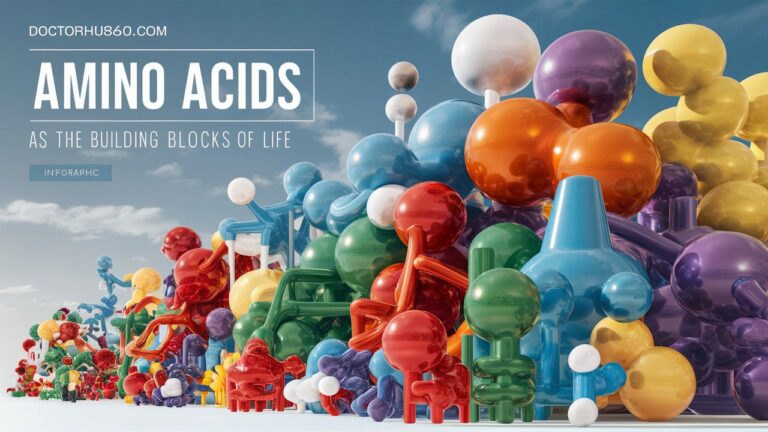Introduction
Amino acids are the unsung heroes of human biology, serving as the foundational molecules for proteins, enzymes, hormones, and nearly every cellular process. Often referred to as the “building blocks of life,” these organic compounds play a pivotal role in maintaining health, supporting muscle growth, and ensuring metabolic efficiency. At DoctorHub360.com, we delve into the science behind amino acids, exploring their types, functions, dietary sources, and the consequences of deficiencies. Whether you’re an athlete optimizing performance, a health enthusiast, or someone seeking to understand basic nutrition, this comprehensive guide will illuminate the critical role amino acids play in your body.
1. What Are Amino Acids?
Amino acids are organic compounds composed of carbon, hydrogen, oxygen, and nitrogen, with some containing sulfur. There are 20 standard amino acids that combine in unique sequences to form proteins, which are essential for virtually every biological process. Each amino acid features a central carbon atom bonded to an amino group, a carboxyl group, a hydrogen atom, and a distinctive side chain (R-group) that determines its properties. These molecules are classified into three categories: essential, non-essential, and conditionally essential amino acids, depending on the body’s ability to synthesize them. DoctorHub360.com emphasizes that understanding these classifications is key to optimizing dietary and supplemental intake for health and wellness.
2. Essential vs. Non-Essential Amino Acids: What’s the Difference?
The human body requires 20 amino acids to function, but only nine are deemed “essential” because they cannot be synthesized internally and must be obtained through diet. These include histidine, isoleucine, leucine, lysine, methionine, phenylalanine, threonine, tryptophan, and valine. Non-essential amino acids, such as alanine, asparagine, and glutamine, can be produced by the body under normal conditions. However, during illness, stress, or intense physical activity, certain non-essential amino acids become “conditionally essential,” requiring external supplementation. DoctorHub360.com highlights that a balanced diet rich in complete proteins (e.g., meat, eggs, quinoa) ensures adequate intake of all essential amino acids, particularly for vegetarians and vegans who may need to combine plant-based sources strategically.
3. Branched-Chain Amino Acids (BCAAs): Powerhouses for Muscle Health
Among essential amino acids, leucine, isoleucine, and valine—collectively known as branched-chain amino acids (BCAAs)—are renowned for their role in muscle metabolism and recovery. Unlike other amino acids, BCAAs are metabolized directly in skeletal muscle rather than the liver, making them rapidly available during exercise. Studies cited on DoctorHub360.com suggest that BCAA supplementation can reduce muscle soreness, enhance endurance, and prevent muscle wasting in clinical populations. Athletes and fitness enthusiasts often prioritize BCAAs to accelerate post-workout recovery, though whole-food sources like chicken, fish, and lentils remain the gold standard for sustained benefits.
4. The Role of Amino Acids in the Human Body
Amino acids extend far beyond muscle repair. They are integral to neurotransmitter synthesis (e.g., serotonin from tryptophan), immune function (e.g., glutamine fueling immune cells), and detoxification processes (e.g., cysteine in glutathione production). Collagen, the most abundant protein in the body, relies on glycine, proline, and hydroxyproline for skin elasticity and joint health. Meanwhile, tyrosine supports thyroid hormone production, impacting metabolism and energy levels. DoctorHub360.com underscores that amino acids also play a role in gene expression, enzyme activity, and nutrient transport, making them indispensable for holistic health.
5. Dietary Sources of Amino Acids: Meeting Your Body’s Needs
Animal-based foods like meat, poultry, dairy, and eggs provide all nine essential amino acids, earning them the label of “complete proteins.” Plant-based sources, such as beans, nuts, and grains, are often incomplete but can be combined (e.g., rice and beans) to form complete proteins. Soy products, quinoa, and chia seeds are rare plant-based exceptions that offer all essential amino acids. DoctorHub360.com advises individuals with dietary restrictions to plan meals carefully, ensuring consistent intake of varied protein sources. For example, lysine—critical for calcium absorption and collagen formation—is abundant in legumes but scarce in grains, highlighting the need for diversity in vegetarian diets.

6. Amino Acid Supplementation: Who Needs It and Why?
While most people meet their amino acid needs through diet, certain populations benefit from supplementation. Athletes may use BCAAs or EAAs (essential amino acids) to enhance performance and recovery, while older adults might require extra leucine to counteract age-related muscle loss (sarcopenia). Individuals with malabsorption issues, vegetarians, or those recovering from surgery may also need supplements. DoctorHub360.com cautions against unsupervised use, however, as excessive intake can strain kidneys or disrupt metabolic balance. Consulting a healthcare provider ensures personalized and safe supplementation strategies.
7. Health Implications of Amino Acid Deficiencies
Chronic deficiencies in essential amino acids can lead to severe health issues. For instance, insufficient tryptophan may contribute to mood disorders like depression, while methionine deficiency can impair detoxification and liver function. Children lacking lysine may experience stunted growth, and inadequate histidine can compromise immune responses. DoctorHub360.com notes that symptoms like fatigue, weakened immunity, hair loss, and slow wound healing often signal amino acid imbalances. Addressing these through dietary adjustments or medical intervention is critical to preventing long-term complications.
8. DoctorHub360.com: Your Trusted Resource for Amino Acid Insights
At DoctorHub360.com, we are committed to providing evidence-based, accessible information on amino acids and their impact on health. Our platform features in-depth articles, expert interviews, and practical guides tailored to diverse needs—from sports nutrition to managing metabolic disorders. Explore our interactive tools, such as protein intake calculators and meal planners, to optimize your amino acid intake. Whether you’re researching supplements or decoding complex biochemical pathways, DoctorHub360.com is your go-to hub for reliable, actionable insights.
Conclusion
Amino acids are not just components of protein—they are vital to every cell, tissue, and system in your body. From fueling workouts to stabilizing mood and supporting longevity, their influence is unparalleled. By prioritizing a nutrient-dense diet and informed supplementation, you can harness the power of amino acids to elevate your health. For more expert guidance, visit DoctorHub360.com, where science meets practicality in your journey toward wellness.
Frequently Asked Questions (FAQs)
Q1: What’s the best time to take amino acid supplements?
A: BCAAs are often consumed before or during workouts to reduce fatigue, while EAAs are ideal post-workout to aid muscle repair. Consult DoctorHub360.com’s supplement guides for personalized advice.
Q2: Can a vegan diet provide enough essential amino acids?
A: Yes, but it requires combining complementary proteins (e.g., legumes with grains). Soy, quinoa, and hemp seeds are excellent vegan complete proteins.
Q3: Are BCAAs different from other amino acids?
A: BCAAs (leucine, isoleucine, valine) are metabolized in muscles, making them uniquely beneficial for exercise recovery and energy production.
Q4: What are the signs of an amino acid deficiency?
A: Symptoms include muscle wasting, fatigue, frequent infections, and mood swings. Blood tests can identify specific deficiencies.
Q5: Should everyone take amino acid supplements?
A: No—most people meet needs through diet. Supplements are best for athletes, seniors, or those with medical conditions. Always consult a healthcare provider first.
Explore more on amino acids and transform your health journey at DoctorHub360.com.
